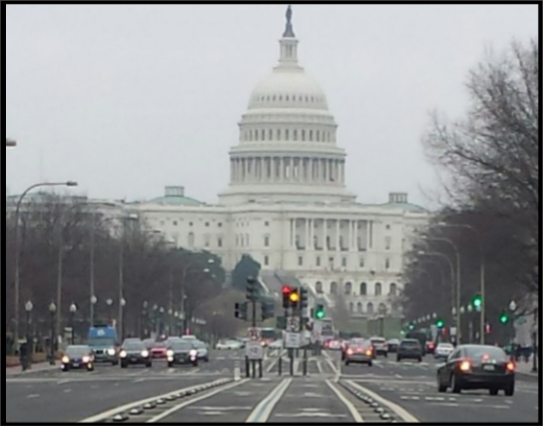 Photo of the US Capitol, by Jack Hubbard on Pennsylvania Avenue, Feb 26, 2018
Photo of the US Capitol, by Jack Hubbard on Pennsylvania Avenue, Feb 26, 2018
I’ve attended the PCC Mission to DC about 20 times as a member of the CBFANC delegation--as Legislative Chair or committee member, President, or proud, professional member. Every year the event is meaningful and engaging. You could say that this year’s Mission was no exception, EXCEPT that it was! Why? For starters, consider that the current Administration threatens to move forward with measures that seem to contradict the hard-won efforts of the past that have enhanced free and fair trade. Abandon NAFTA? ADD/CVD on steel and aluminum? Punitive tariffs on goods from China? Trade war, anyone?
Clearly, the 2018 PCC Mission to DC came at an extremely EXCEPTIONAL time.
On Monday, February 26
th, we again met with Angela Ellard, Chief Republican Trade Counsel, House Ways and Means Committee, who provided valuable insights into the state of affairs of our nation’s Capitol. NAFTA renegotiation was top on her list, as she was set to travel within days to Mexico to help guide the efforts to salvage (or “improve”) this important trade agreement. While some of the rhetoric coming from the Administration is anti-trade, Angela stated that “Congress has not changed” and that many on the Hill are still strongly committed to pursuing the benefits that free trade brings to the economy of the United States. As we head to the Hill for our meetings, our message to our legislators should be: “Do no harm.” The U.S. economy is thriving and we should remind our representatives that trade is a big component of this prosperity.
Wednesday, Feb 27
th, was our day to visit our elected representatives on the Hill, and we began the day with a breakfast speech from John Gold of the National Retail Federation. Mr. Gold advised that “retail is alive and well!” Yet, many harbor serious concerns about potential loss of the benefits that free trade brings, and that retailers of all stripes (ecommerce or brick and mortar) face new challenges wrought by the Administration’s hostility toward existing trade agreements, as well as its threats of new tariff barriers.
Our first meeting after breakfast was with Greta Peisch, Senate Finance Committee Democratic International Trade Counsel, and Queen Fan, Senate Finance Committee Policy Advisor. We spoke at length about Sec 321/de minimis issues, and presented our concerns regarding CBP and PGA enforcement, the possible dangers to the safety and health of the US consumers, and our government’s lack of preparedness for the tidal wave of de minimis shipments that have started to hit the US border (mystery: what will be the role of our $3 billion system called ACE?). Another topic stressed by our delegation was the importance of drawback to U.S. exporters, and the problems that drawback filers have encountered with the adaptation of drawback to ACE. Concerns were also raised about the loss of accelerated payment under TFTEA, which creates huge financial burdens for both claimants and filers of drawback.
During the remainder of the day, the CBFANC delegation had appointments at nine Congressional offices. At times, our group split in two to take full advantage of the jam-packed schedule of meetings and discussions with Hill staffers. By the end of the day my CBFANC team had met with Sarah Jackson, Legislative Assistance for House Minority Leader Nancy Pelosi; Crozer Connor, Legislative Aide for Rep. Mike Thompson (Ways & Means Committee); Miriam Goldstein PhD, Legislative Director for Rep. Jackie Speier; Eric Olsen, Press Secretary and Legislative Assistant to Rep. John Garamendi; and Tracey Chow, Legislative Assistant for Rep. Jeff Denham. We were warmly received by all offices, and our meetings were longer and more substantive than usual. A great deal of interest was shown regarding Sec 321/de minimis, and drawback. We extended an invitation to Rep. Speier to speak at another CBFANC event in 2018 (more to follow). Several of the offices followed up with emails asking for more details regarding de minimis. We truly felt that our messages were heard and taken seriously. I wish to thank all members of Congress who made themselves or their aides available to us.
I spent much of the day walking from building to building and from office to office with CBFANC’s President, Chris Ramos. He had an app on his watch that kept track of his steps and he (and that means all of us) found that he walked over 13,000 steps on Tuesday! The adrenalin kept us going, and the Mission wrap up session (and glass of wine) at the end of the day helped get us back to earth.
In addition to the above, we attended the PCC board meeting on Sunday, dinners sponsored by Avalon and Roanoke on Sunday and Monday, a full morning of meetings at CBP HQ on Monday, as well as afternoon sessions with FDA and the FMC.
The kick off was a wonderfully warm reception open to all PCC Missionaries by Debbie and Peter Friedmann on Saturday evening in their beautiful penthouse on Pennsylvania Avenue. It was a perfect way to start an action-packed PCC Mission to DC!
Many thanks to Peter and his crew—Abigail Struxness, Ray Bucheger and Stephen Hudson—for setting up all the meetings and attending to our interests in DC. Cheers to Our Man in DC, Ray, Abigail and Stephen!!